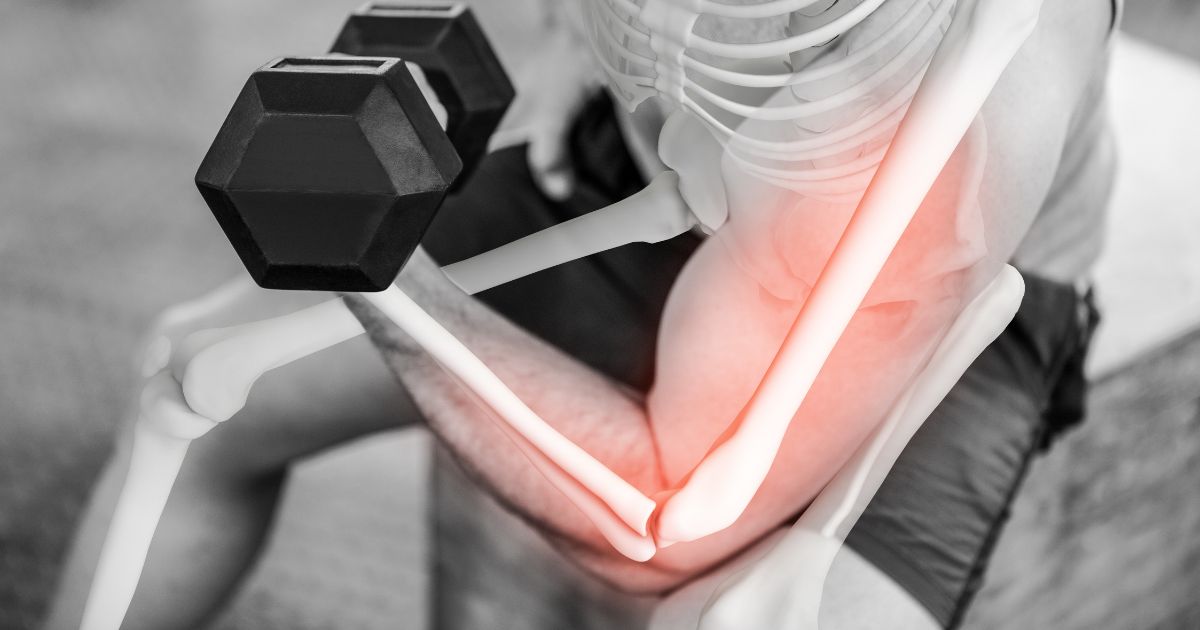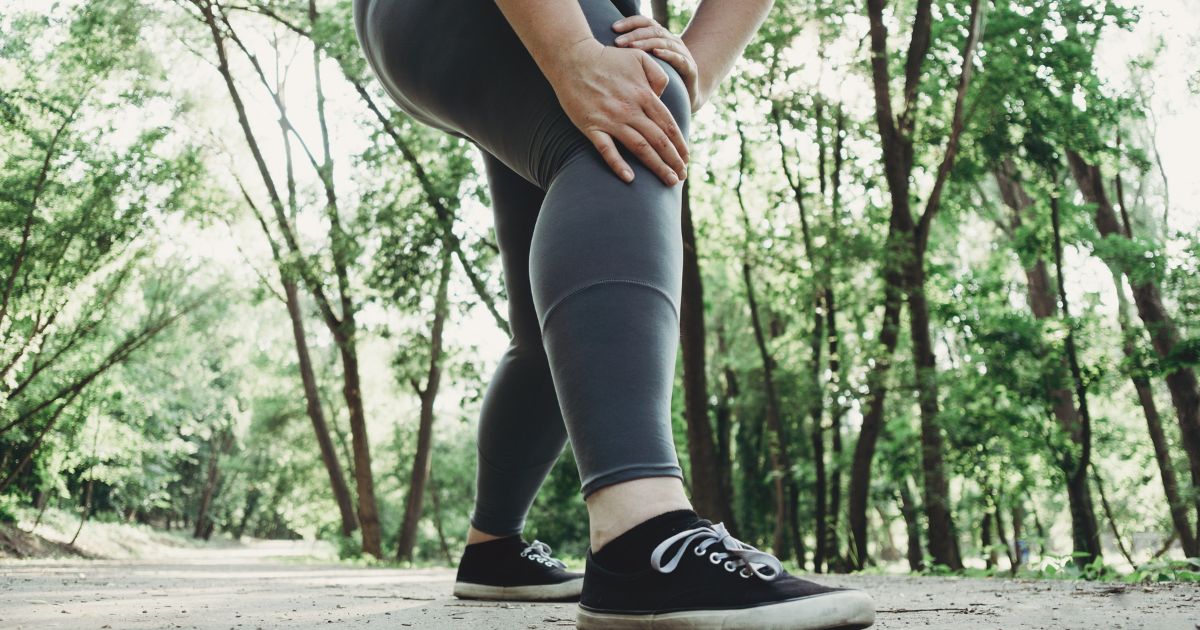The Importance Of Joint Health
Understanding The Role Of Joints
It’s easy to take our joints for granted as they work hard for us every moment of every day. However, understanding the role of joints in your body is crucial for grasping how your body actually works.
Joints act as hinges, connecting your bones and allowing them to move. There are different types of moveable joints, such as hinge joints (like the elbow), ball-and-socket joints (like the hip), and pivot joints (like the neck).1
Joints enable us to bend our knees, wiggle our fingers, and turn our heads. They also help us walk, run, and jump. Without joints, our bodies would be stiff and immobile.
We’d be nothing without our joints, which is why it’s so essential to take care of them – now. Supporting joint health can help us enjoy an active life in the years ahead.
Why Is Joint Health So Important?
Joint health is extremely important to your overall well-being and quality of life – especially as you age. Healthy joints allow for smooth movement, preventing discomfort while doing activities – from the basics, like getting out of bed, walking, or bending, to more strenuous activities, like dancing or playing sports.
Healthy joints also help prevent bone wear and tear.2
Taking care of your joints is investing in your future. Joint mobility not only helps ensure that you can participate in activities and lead a happier lifestyle, but it may also help protect you from dangerous falls.3
Starting With The Basics: Your Body And Joints

Basic Composition Of Joints
Joints are made up of a few key components. The basic composition of a joint includes two or more bones that come together, usually covered in a layer of smooth cartilage that helps reduce friction during movement. Ligaments, tough and flexible bands, then connect these bones and provide stability. A joint capsule surrounds the joint, filled with synovial fluid that lubricates and nourishes the joint. This fluid-filled space allows for smooth, comfortable joint movement.4
Different types of joints each contribute to your body’s overall mobility. They’re categorized by how much movement they allow:
- Immovable – the two or more bones are in close contact, but no movement can occur – e.g. the bones of the skull.
- Slightly movable – two or more bones are held together tightly so that only limited movement can happen – e.g. spinal vertebrae.
- Freely movable – this covers most joints of the human body; motion is the sole purpose of these joints.5
Factors Affecting Joint Health
Aging And Joint Deterioration
Joint deterioration is a natural part of the aging process, and it can manifest in various ways:
- The cartilage that cushions the ends of our bones tends to wear down over the years, making movement less smooth.
- The production of joint lubricating synovial fluid may decrease, leading to stiffness.
- Ligaments tend to get shorter and less flexible, making joints feel stiff.6
Age-related joint deterioration is also influenced by other factors. For example, certain genetic factors may predispose people to joint issues as they grow older.7
Past injuries, especially those that were not properly rehabilitated, may also contribute to joint problems later in life. And, excess weight may strain the joints, leading to faster deterioration.8
While aging is inevitable, joint discomfort and limited mobility is not. You can maintain bone and joint health at any age, provided you undertake the right measures.
Impact Of Lifestyle Choices On Joint Health
Your lifestyle choices have a significant impact on your joint health – both positively and negatively.
Excess weight, for instance, puts additional pressure on weight-bearing joints, like your knees, hips, and back, potentially accelerating cartilage wear and tear. Lack of physical activity can lead to joint stiffness and muscle weakness.9
Not eating enough fruits, vegetables, fatty fish, and other foods rich in essential nutrients can impede joint health maintenance, as can drinking excessive amounts of alcohol.10
Smoking is a well-known nemesis to joint health.11
Making healthier lifestyle choices can help fortify joint health and contribute to overall physical wellness.

Tips For Ensuring Robust Joint Health, Naturally
1. Maintaining A Healthy Weight
Maintaining a healthy weight is crucial for optimal joint health, especially for weight-bearing joints like your knees, hips, and back. Research shows that even a slight increase in body mass index (BMI) can negatively affect joints.12
On the other hand, being underweight can lead to joint weakness and a lack of muscle support.13
2. Regular Exercise
Regular physical activity is essential for keeping your joints healthy. It helps strengthen the muscles that support and protect your joints, increases flexibility, assists in maintaining bone strength, and enhances balance.14
The recommended guideline is to include at least 150 minutes of moderate-intensity physical activity, partnered with regular muscle-strengthening exercises, each week.15
3. The Right Posture Makes A Huge Difference
Posture refers to how you hold your body while sitting, standing, or performing tasks, like lifting or bending.
Proper posture ensures good alignment of the body, promoting efficient use of muscles and reducing strain on your joints. Slouching or hunching can wreak havoc on your joints, leading to back discomfort and, potentially, joint degeneration.16
Regular exercises, like shoulder rolls, wall sits, and sit-ups can all help support better posture.
4. Keeping Stress Under Control
Stress not only affects your mental well-being, but it may also have consequences for your joint health.
There is a direct link between stress and joint irritation, and joint discomfort can be provoked by an increase in emotional stress. The body also releases stress hormones, like cortisol, as part of its stress response. This may lead to muscle tightening and an increased sensitivity to discomfort.17
Physical activity, such as yoga or meditation, may help reduce stress and relax your muscles, supporting healthy joints.
5. Nutrition’s Role In Joint Health
Nutrition plays a significant role in maintaining joint health. A balanced diet rich in certain nutrients can help keep your joints functioning at their best. Here’s a quick look at some important foods to include in your diet:
- Fatty Fish: Eat 3-4 oz. of fish, twice a week. Seek out salmon, tuna, sardines, herring, anchovies, scallops, and other cold-water fish. Or, take a fish oil supplement.
- Nuts and Seeds: Eat 1.5 ounces of nuts daily (about a handful). Seek out walnuts, pine nuts, pistachios, and almonds.
- Fruits and Vegetables: Aim for 9+ servings daily (one serving = a cup of most veggies/fruit). Seek out colorful fruits and vegetables — the darker or more colorful, the more antioxidants they have. Think blueberries, cherries, spinach, kale, and broccoli, plus citrus fruits like oranges, grapefruits, and limes.</li>
- Olive Oil: Aim for 2-3 tablespoons daily. Seek out extra virgin olive oil, avocado, safflower, or walnut oil (which has 10 x the omega-3s that olive oil has).</li>
- Beans: Try for at least one cup, twice a week. Seek out small red beans, red kidney beans, and pinto beans.
- Whole Grains: Eat a total of 3 oz. of whole grains per day (1 oz = ½ cup cooked brown rice or one slice of whole-wheat bread). Seek out whole-wheat flour, oatmeal, bulgur, brown rice, and quinoa.18
1. Staying Hydrated
Staying hydrated is a simple, but key, step in maintaining joint health.
Firstly, your joints have a fluid cushioning called synovial fluid that reduces friction and helps with smooth movement. As this fluid is primarily made up of water, drinking plenty of water can help keep your joints lubricated and functioning well.19
Secondly, cartilage, which forms the covering on bone ends, mainly consists of water. A well-hydrated body helps maintain the flexibility and elasticity of this cartilage, reducing the chance of damage due to wear and tear.20
2. Herbs And Natural Ingredients That Help Support Joint Health
Many herbs and natural ingredients have been studied and proven to play a role in supporting joint health. These may come in the form of capsules, teas, creams, tinctures, and cooking herbs. Here are a few worth including in your diet, according to The Arthritis Foundation:
- Turmeric (curcumin)
- Ginger
- Boswellia serrata
- Devil’s claw
- Willow bark extract
- Feverfew
- Arnica and Comfrey gels
- Creams made with capsaicin21
Before trying any herbal supplement, you should always consult with your doctor.
1. Warming Up Before Exercise
Warming up before you exercise is extremely important for healthy joints. It helps increase the flow of blood to your muscles, allowing them to move freely. A quality warm-up routine also enhances flexibility and helps ease stiffness, allowing for more effective workouts.22
Remember, when it comes to your mobility – “motion is lotion.”
2. Ditch Smoking For Better Joints
Smoking can significantly hamper all areas of health, including joint health.
Studies have found that smoking slows down the body’s natural healing mechanisms and reduces blood flow, both of which can make it more difficult to recover from injuries.23
Smoking can also affect the success of medications for joint conditions.24
3. Understanding your Limits
While regular physical activity, a nutritious diet, and a healthy lifestyle are largely beneficial to joint health, it’s equally essential to understand and respect your body’s limits – no matter your age. Ongoing soreness or discomfort is an alert from your body that it’s overworked and requires rest.
You should consult with healthcare professionals or physical therapists if you’re unsure about your personal limits or experience any persistent joint issues.
Can Collagen Supplements Help My Joint Health?
Collagen supplements have gained popularity for their potential benefits in supporting joint health. Collagen is a protein that plays a crucial role in maintaining the structure and strength of our skin and joints. The problem is that collagen production slows with age. And, the collagen the body does produce isn’t as high-quality as it once was.25
Some research has shown that hydrolyzed collagen can help support healthier knee joints and even potentially benefit cartilage repair.26
A review of studies in people with ongoing joint issues found that taking collagen helped to promote better joint mobility and comfort.27

Final Thoughts: Supporting Joints For the Years Ahead
Taking care of your joints as you age is paramount for maintaining an active and fulfilling lifestyle.
With the natural wear and tear that comes with time, it’s essential to adopt healthy measures that support joint health. This includes staying physically active, maintaining a healthy weight, and consuming a balanced, nutrient-rich diet.
Preventative steps, like regular exercise and mindful lifestyle choices, can help ease the risk of age-related joint problems and support overall quality of life.
By making joint health a priority, you can continue to enjoy mobility and the freedom to engage in activities you love throughout the aging process.
Sources
- https://www.betterhealth.vic.gov.au/health/conditionsandtreatments/joints#types-of-movement
- https://www.niams.nih.gov/health-topics/kids/healthy-joints#:~:text=It%20also%20protects%20bones%20by,things%20you%20like%20to%20do.
- https://www.ncoa.org/article/get-the-facts-on-falls-prevention
- https://www.urmc.rochester.edu/encyclopedia/content.aspx?contenttypeid=85&contentid=P00044
- https://www.betterhealth.vic.gov.au/health/conditionsandtreatments/joints#types-of-movement
- https://www.betterhealth.vic.gov.au/health/conditionsandtreatments/ageing-muscles-bones-and-joints
- https://www.healthline.com/health/is-osteoarthritis-genetic#genetic
- https://www.jospt.org/doi/10.2519/jospt.2013.4796
- https://www.ncbi.nlm.nih.gov/pmc/articles/PMC9736780/
- https://www.ncbi.nlm.nih.gov/pmc/articles/PMC9736780/
- https://www.ncbi.nlm.nih.gov/pmc/articles/PMC9736780/
- https://www.ncbi.nlm.nih.gov/pmc/articles/PMC4679914/
- https://www.arthritis.org/health-wellness/about-arthritis/related-conditions/physical-effects/expert-q-a-ra-and-weight-loss
- https://www.hopkinsarthritis.org/patient-corner/disease-management/role-of-exercise-in-arthritis-management/#:~:text=Regular%20physical%20activity%20can%20keep,and%20reduces%20stiffness%20and%20pain.
- https://www.cdc.gov/physicalactivity/basics/adults/index.htm
- https://www.betterhealth.vic.gov.au/health/conditionsandtreatments/posture
- https://www.americanhipinstitute.com/blog/can-stress-increase-joint-pain-35293.html#:~:text=There%20is%20a%20direct%20link,tightening%20and%20increased%20pain%20sensitivity.
- https://www.arthritis.org/health-wellness/healthy-living/nutrition/anti-inflammatory/the-ultimate-arthritis-diet
- https://creakyjoints.org/living-with-arthritis/dehydration-and-arthritis/#:~:text=When%20you’re%20dehydrated%2C%20your,and%20keeping%20our%20joints%20healthy.%E2%80%9D
- https://creakyjoints.org/living-with-arthritis/dehydration-and-arthritis/#:~:text=When%20you’re%20dehydrated%2C%20your,and%20keeping%20our%20joints%20healthy.%E2%80%9D
- https://www.arthritis.org/health-wellness/treatment/complementary-therapies/supplements-and-vitamins/5-ways-to-take-herbs-and-supplements-for-arthritis
- https://versusarthritis.org/news/2023/february/why-its-important-to-warm-up-before-exercise-if-you-have-osteoarthritis/#:~:text=Warming%20up%20properly%20and%20raising,synovial%20fluid%20to%20work%20better.
- https://uthealthaustin.org/blog/lifestyle-changes-to-reduce-joint-pain
- https://www.arthritis.org/diseases/more-about/smoking-can-be-hazardous-to-joints
- https://www.arthritis.org/health-wellness/treatment/complementary-therapies/supplements-and-vitamins/can-collagen-supplements-help-arthritis
- https://www.arthritis.org/health-wellness/treatment/complementary-therapies/supplements-and-vitamins/can-collagen-supplements-help-arthritis
- https://www.healthline.com/nutrition/collagen-benefits#benefits

